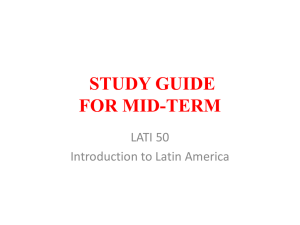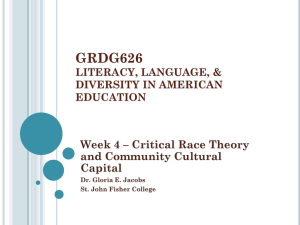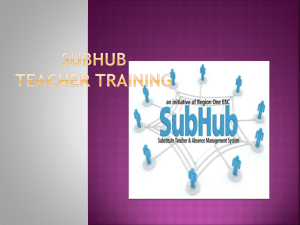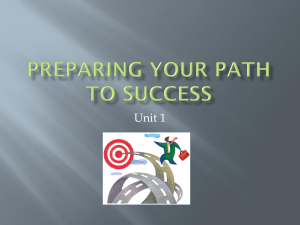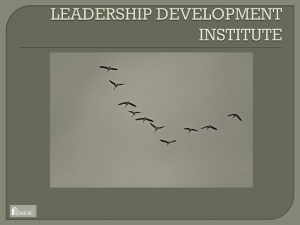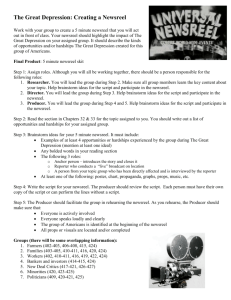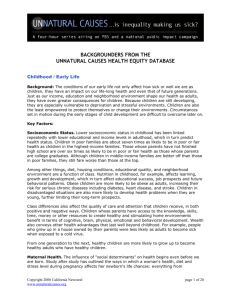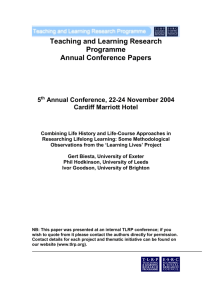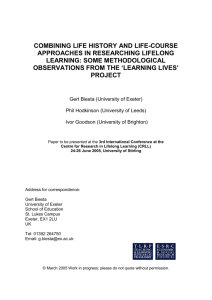“If you want 1 year of prosperity, grow grain. If you want 10 years of
advertisement
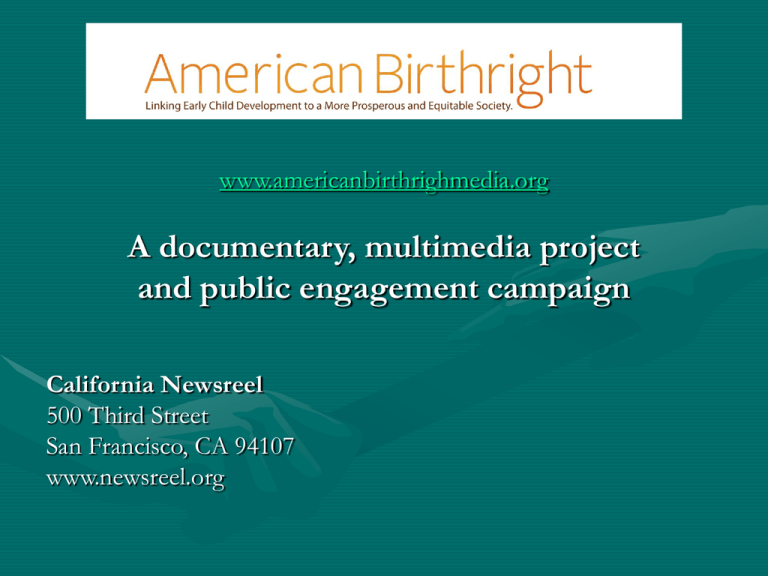
www.americanbirthrighmedia.org A documentary, multimedia project and public engagement campaign California Newsreel 500 Third Street San Francisco, CA 94107 www.newsreel.org “If you want 1 year of prosperity, grow grain. If you want 10 years of prosperity, grow trees. If you want 100 years of prosperity, grow people.” - Chinese Proverb “It is easier to build strong children than to repair broken men.” - Frederick Douglass “Evidence is rarely if ever sufficient by itself to catalyze political action. “In political terms, what might be at least as crucial as the evidence itself is the ‘story’ in which it is embedded.” - World Health Organization’s (WHO) Commission on the Social Determinants of Health HEALTH CARE… Some Strengths and Absences • Individual-based, but not population-based work • Targeting services to those most in need, but not structural racism, nor the larger policies and social and economic arrangements • Importance of life-course, social determinants and equity increasingly acknowledged, but not yet integrated into work. Strengths & Absences - 2 Value and benefits of early care and pre-K promoted, but the voices of children and teachers not often spotlighted. Pre-natal care, but little pre- or interconception care. Growing emphasis on return on investment (ROI), but that resonates more with policy makers than the public. Strengths & Absences - 3 Trainings include toxic stress, but more rarely link stressors to neglected neighborhoods, the larger socio-economic environment, nor their patterning by class and race. Conduct education and trainings, but little public / community leadership development. Strong research, but ‘translation’ efforts are lagging. Strengths & Absences - 4 ECD seen as a school readiness issue, but not as vital to a safer, happier, more productive, more prosperous and more equitable America. Conventional Frames and Mental Models • • • • • Personal Responsibility and ‘Right Choices’ The Self-Determining Individual Dysfunctional Cultures The ‘Family Bubble’ Sovereign Rights of Parents Conventional Frames - 2 • • • • • Sovereign Rights of Parents The Imperiled Child Narrow interpretation of Development Kids are Naturally Resilient DNA is Destiny Conventional Frames - 3 • • • • • The Problem is ‘Those’ Children, Not ‘Us’ Exceptionalism and Denial Childcare Isn’t about Child Development Government is the Problem Ignorance of Effective Initiatives Elements of a New ‘Story’ • The stakes are high • Relationships and early experiences build the foundation for lifelong physical, cognitive and socio-emotional health • A safe, stable and stimulating environments is critical • Take a life-course perspective New ‘Story’ – 2 • Health begins with the well-being of the mother even before conception • DNA is NOT destiny • Avoid a new determinism • Brain plasticity decreases over time • Strong Communities are the Foundation for Health Children New ‘Story’ - 3 • Widen attention from negligent parents to the negligence of society • Focus not on unequal outcomes but the inequities that drive those outcomes • Make it political • Racism not Race New ‘Story’ - 4 • Invest now or pay more later • Inspire hope and communicate possibility • Make ECD an “us” issue “The message needs to be something simple. Complex is hard to do. So herein lies the problem: this is a highly complex issue that we are trying to simplify.” - Byron Egeland Univ. of Minnesota Appeal to Common Sense CHALLENGES 1. How do we impel a sense of urgency? 2. What models / stories / metaphors can best rupture the family bubble / mentalist frame? 3. How best to focus on the mundane 1000 cuts and not just the trauma of abuse and extreme neglect? 4. Chronicle the stories of individuals, with all their peculiarities, in a show about the conditions and outcomes of populations, i.e., averages. Challenges - 2 5. How do we make this an “us” issue yet underscore the special adversities faced by the poor, especially poor communities of color? 6. How do we underscore the importance of early origins yet not give rise to a new determinism? 7. Rather than focus on mitigating the impacts of poverty, how might we challenge poverty and structural racism itself ? On Line Learning Center 1. The Documentary 2. Learning Modules 3. Learning Objects 4. The Digital Platform Sample 10-20 min. modules • Beyond the 'Family Bubble': How Community Environments Shape Opportunity Structures • Building Resilience from Start to Finish: A Life Course Perspective on Health and Well-being • Fight Crime: Invest in Kids • The Geography of Opportunity: Segregation, Place and Child Health • Making Work Pay: Balancing Work Life and Family Life Sample 10–20 min. modules - 2 • Nature and Nurture: DNA Is Not Destiny • A Nurturing Child Environment: Safe, Stable and Stimulating • A Short History of Childhood • Strengthen America: The Social and Economic Benefits from Investing in Children Sample 10-20 min. modules - 3 • Tackling Inequality: Supporting Children by Transforming Their Communities • Toxic Stew: The Impact of Poverty, Racism and Adversity on the Developing Brain • Who’s Minding the Kids? Accessible, Affordable and Quality Daycare • A Womb With a View: Maternal Health and Child Outcomes Perhaps it takes a child to raise a village
